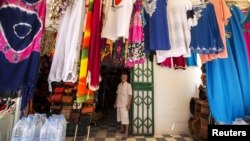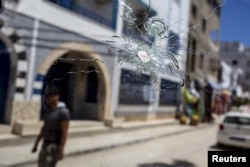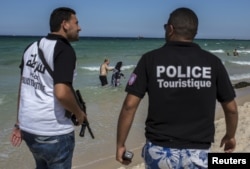Tunisian shopkeeper Aghmi Bubaker doesn't need to be told that he is experiencing the worst threat yet to his 40-year career in tourism - the bullet hole in his battered green Mercedes Benz is a daily reminder.
Last Friday when a gunman attacked the Imperial Marhaba hotel in Sousse in the name of Islamist militancy, Bubaker rushed dozens of vacationers into his store until the shooting - in which 39 foreign tourists were killed - was over.
Now, looking at his car and bullet holes in nearby walls, Bubaker wonders whether his country's tourism industry is at an end too. Thousands have left the North African country since Friday and the government estimates the sector will lose $500 million this year - a quarter of last year's total revenues.
"If tourists don't come back, it's over," Bubaker said outside his store filled with flags, T-shirts and crafts. "It's not just me, it's two million Tunisians who live off this business, hotels, taxis, stores, restaurants."
Friday's attack hit at the heartland of Tunisia's Mediterranean beach resorts, popular with Europeans who make up a portion of the six million vacationers who visit each year places like Sousse, Hammamet and the island of Djerba.
Targeting tourists and sparing Tunisians, the gunman Saif Rezgui shot his way through the hotel, leaving bodies on the beach, before he was killed by police. Most victims were Britons and authorities are still investigating his militant ties.
It is the second attack against a Tunisian tourism this year after the massacre in March at the Bardo museum in Tunis where two gunmen opened fire on tourists as they arrived by bus.
Spanish, Italian and Japanese were among the 21 dead.
Strategy
Targeting tourism in Tunisia appears a deliberate strategy.
The country is just emerging into full democracy after its 2011 uprising against autocrat Zine El-Abidine Ben Ali and is at a sensitive juncture as the new government tries to kickstart the economy and create the jobs demanded by young Tunisians.
Tourism provides seven percent of gross domestic product, a major source of foreign currency revenues and the largest source of employment outside agriculture. Unlike its wealthy neighbors Algeria and Libya, it has few natural resources like oil.
With its clear Mediterranean waters, solid tourist infrastructure and desert treks to the south, Tunisia has until now been popular with Europeans, attracting 760,000 trips by French vacationers, 425,000 by Germans and 400,000 by Britons in 2014, according to Euromonitor International.
By Monday at least 8,000 Britons had already been flown home, according to tourism companies TUI Group and Thomas Cook, as the U.K. government said the final death toll of its citizens was likely to be around 30 people.
The sector had only just started to recover after the Bardo museum attack, after which French tourist bookings dropped 40 percent.
International arrivals to Tunisia rose 4 percent from 2013 to 2014, Euromonitor said, but the attack put that at risk.
"This growth is highly dependent on the safety and stability in Tunisia," said Euromonitor travel analyst Nadejda Popova.
British tourism companies such as Thomas Cook, Monarch and Jet2, have offered customers booked to go to Tunisia in the next few weeks the free option of cancelling or amending vacations.
But the attack may have a much longer term impact.
A spokesman for Britain's travel business group ABTA compared it with the killing of 62 people, mostly tourists, near to Luxor in Egypt in 1997. After that attack, bookings did not return to previous levels for four to five years.
About 100,000 French tourists had booked for July in Tunisia and at this stage 75 percent had decided to cancel their trip, according to Jean-Pierre Mas, Chairman of French travel agency federation SNAV.
"The impact is very strong. The summer season is lost [for Tunisia]," he said.
Drastic action
Visiting British, German and French ministers in Sousse on Monday were quick to express solidarity with Tunisia and offer cooperation on frontier and airport security. But it wasn't enough for other tour companies who are already taking more drastic action.
Sweden's Ving, part of Britain's Thomas Cook Group, cancelled all Tunisia departures out to October 20.
Detur, the tour operator in Sweden with the largest amount of passengers in Tunisia, and part of Dutch Detur International, has cancelled all its departures to the country through July.
"We hope to be able to resume travel in the autumn but a decision will be made later on," Detur said in a statement.
In Sousse, where tourism provides 20,000 jobs, the number of tourists on the beaches had noticeably dropped but local people with businesses along the palm-fringed boardwalk were putting on a brave face.
"We're still waiting for the full high season for our commerce to take off," said local craftsman Samir Ajili.
Armed tourism police were making the rounds near the city's all-inclusive resort hotels. But some said it was too little, too late.
"If Tunisia's tourism is affected, it is not our fault," said French tourist Yann as he left. "We came even after the Bardo attack. But the authorities should have better protected the tourists here."












